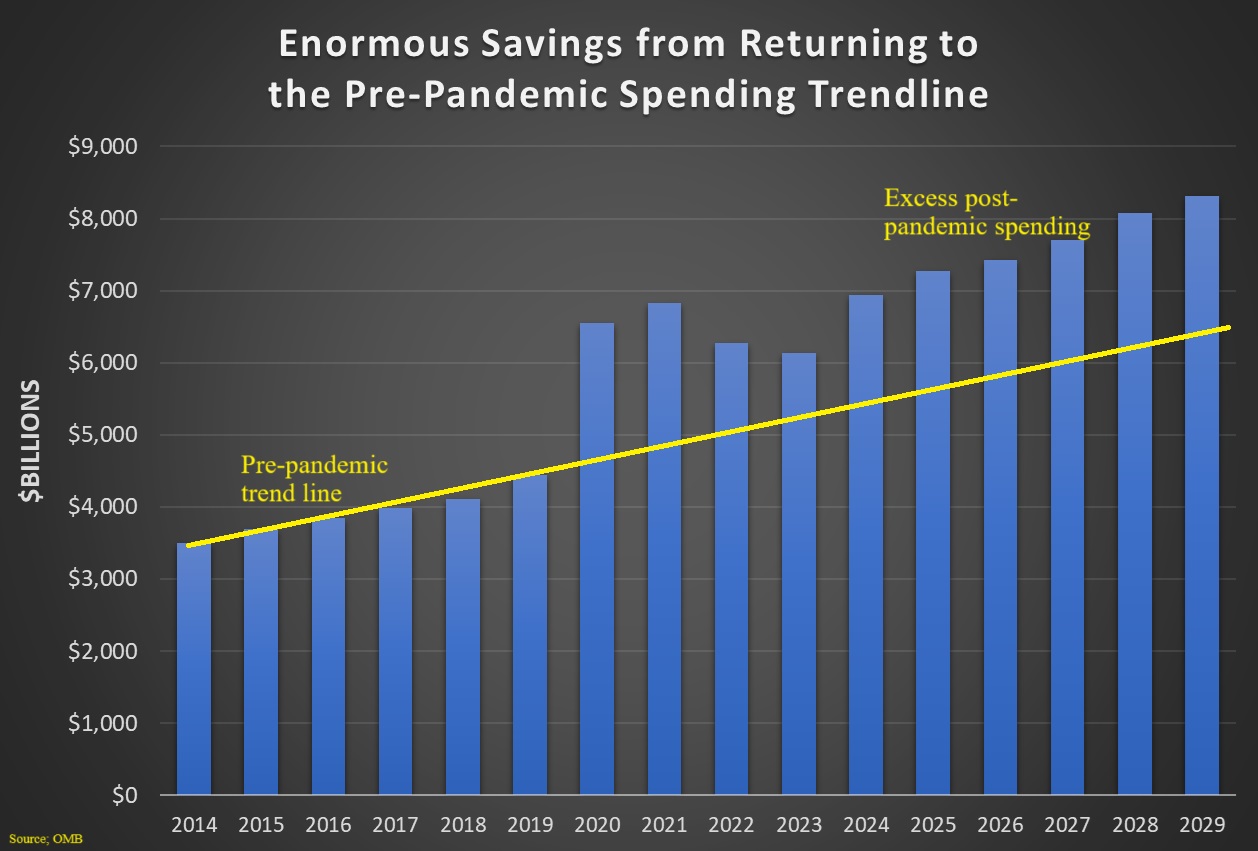"Many people mistakenly think that America’s main fiscal problem is annual budget deficits that are now approaching $2 trillion.
It is not good to have so much red ink, to be sure, but the real problem is that the federal government is spending far too much money.
Excessive government is a bad idea whether it is financed by taxes, by borrowing, of by money-printing.
All of which explains why I think my Golden Rule is the key to good fiscal policy. And that means focusing on trend lines.
Speaking of which, here’s a very depressing chart. Using historical data from Biden’s last budget, it shows that the federal budget expanded dramatically during the COVID pandemic, then declined slightly, but never returned to the pre-pandemic trendline.
There are three things to understand about this chart. The first two things matter when looking at the past.
- First, spending was growing too fast before the pandemic.
- Second, spending exploded during the pandemic.
But our final thing to understand is critically important when looking at the future.
- Third, politicians used the pandemic to ratchet upwards the spending trendline.
One member of the U.S. Senate seems to understand that this is the real problem. Here are some excerpts from a column in the Wall Street Journal by Ron Johnson of Wisconsin.
Federal spending is out of control. In fiscal 2019, which ran from Oct. 1, 2018, to Sept. 30, 2019, federal outlays totaled $4.447 trillion. In fiscal 2020, federal outlays jumped to $6.554 trillion because of the pandemic spending spree. …Even if you think Covid relief spending levels were appropriate (I don’t), there was no justification for maintaining that level of spending once the pandemic was over.
Yet we’ve turned pandemic spending into the new baseline, spending $6.6 trillion… In a sane world, Covid spending levels would have been an extreme aberration, and we would have already returned to a more reasonable level of spending. …I think most people would agree that if you were able to grow your family budget based on the increase in your family size plus the rate of inflation… Why not apply that same discipline to the federal budget? …Using 2014 outlays as a base would establish a 2025 budget of $6.2 trillion with a deficit of $700 billion. Using 2019 outlays results in a 2025 budget of $6.5 trillion with a deficit of $1 trillion. …setting baseline spending to one of those budget years isn’t only reasonable but doable.
Needless to say, it warms my heart when anyone endorses spending caps.
From a practical perspective, Sen. Johnson’s spending cap would bring the future spending burden down closer to the yellow line in the above chart.
Sadly, I expect that Trump will have no interest in that goal.
P.S. As always, the titles of my “everything-you-need-to-know” columns are an exaggeration. I use that literary tool to highlight key facts.
P.P.S. The exact same spending trendline problem exists in the United Kingdom."
Saturday, January 4, 2025
In One Chart, Everything You Need to Know about America’s Fiscal Mess
Subscribe to:
Post Comments (Atom)

No comments:
Post a Comment
Note: Only a member of this blog may post a comment.